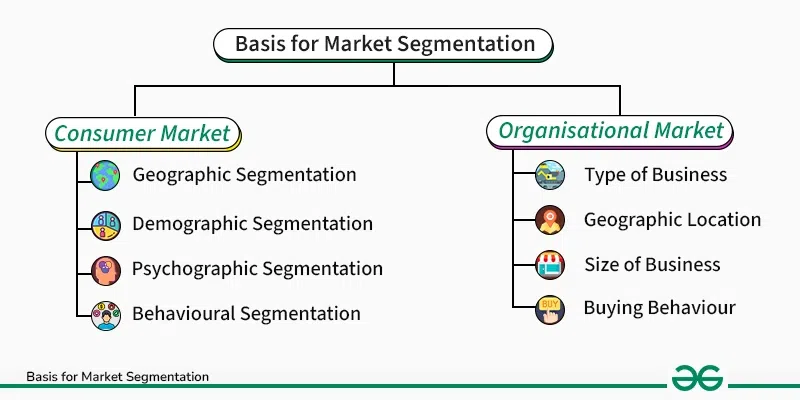Basis for Market Segmentation
Last Updated :
18 Apr, 2024
What is Market Segmentation?
Market Segmentation can be defined as the process of dividing the whole market into small subgroups based on shared characteristics like age, gender, taste, preferences, etc. Customers having similar needs and behaviours are to be put together. A market segment is a portion of the whole market that is expected to respond similarly to a given situation. Segmentation helps the business identify what type of customers they should target to sell their product/service. For these reasons, a company should properly do the segmentation process. Market segmentation can be done based on:
- Psychographic Attributes (lifestyle preferences)
- Geographic Attributes (location)
- Behavioural attributes (habits)
- Demographics (age, gender, etc.)
Once the company is done with the market segmentation process, it can focus on choosing the best segment for its products, and/or services. When the segmentation is done correctly, a company can entirely focus on one or more segments without wasting any time and resources. For example, Volkswagen. Volkswagen Group is responsible for producing brands like Audi, Porsche, Lamborghini, and Ducati. Even after being so expensive, brands still generate a handsome revenue. Volkswagen depicts the importance of perfect market segmentation.

What is Consumer Market?
Consumer market can defined as the market for the people who purchase goods and services for end use and not for resale purposes. The consumer market is for the consumers, not customers. This is the market where goods are sold to individuals and households for their consumption. The consumer market is driven by the choices and preferences of the individual consumers. Various factors like consumers’ preferences, income level, needs, cultural influences, etc., affect the behaviour of consumers. A company can form several segments of the whole consumer market on various bases. Major bases for segmenting the consumer market include geographic, demographic, psychographic, and behavioural variables.
Bases for Segmenting Consumer Market
Major bases for segmenting the consumer market include geographic, demographic, psychographic, and behavioural variables.
1. Geographic Segmentation: Geographic segmentation calls for dividing the whole consumer market into different geographical units such as nations, regions, states, cities, etc. A company may want to target one or more geographical units but should pay attention to the differences in needs and wants of different units. Various factors, like geographical conditions, cultural influence, etc., help identify the various geographic segmentations.
2. Demographic Segmentation: Demographic segmentation involves segmenting the market according to various basic yet important factors. Factors like age, gender, income, etc., determine the segments under demographic segmentation.
3. Psychographic Segmentation: This type of segmentation includes dividing the whole consumer market into various segments based on personality and lifestyle. Personality refers to the combination of various characteristics like traits, habits, attitudes, etc. Lifestyle includes how an individual lives and spends their money and time.
4. Behavioural Segmentation: Behavioural Segmentation involves segmenting the market into various segments based on how an individual reacts in a certain situation or to a particular product/service.
|
Basis
|
Examples
|
|
Geographic Segmentation
|
McDonald’s offers a range of vegetarian options in India, including the McAloo Tikki Burger.
|
|
Demographic Segmentation
|
Coca-Cola segments its market according to various demographic factors and formed segments like the youth market and health-conscious adults.
|
|
Psychographic Segmentation
|
Apple’s marketing and product design are known for appealing to customers who value innovation and creativity.
|
|
Behavioural Segmentation
|
Amazon uses behavioural data to personalise product recommendations for its customers.
|
What is Organisational Market?
Organisational Market can be defined as a business-to-business (B2B) market where businesses and organisations engage to sell and buy goods and services for further use and not for consumption. In this market, goods and services are acquired to support the operations of the organisations. Business often segments organisational market on various bases for the sale of their goods and services. Major bases for segmenting the organisational market include the type of business, business nature, size of business and buying behaviour.
Bases for Segmenting Organisational Market
Major bases for segmenting the organisational market include the type of business, geographic location, size of business, and buying behaviour.
1. Type of Business: Organisational market segmentation can be done based on the type of business. There are various sectors in the economy, the demands of which can differ from one another. Sectors like agriculture, mining, communication, services, construction, etc., need different types of technology and functions.
2. Geographic Location: Organisational segmentation can be done on the basis of the location of the buying business. Different locations have different weather, culture, lifestyle, etc. On the basis of these factors, businesses decide to target one or more segments.
3. Size of Business: The size of the buying business can also affect the segmentation strategy. Businesses can be small, medium-sized, and large-sized. Medium and large-sized businesses are given more preference over small-sized businesses.
4. Buying Behaviour: Organisational market segmentation can be done on the buying behaviour of a business. Business buying behaviour can include new buyers, modified buyers, and repeat buyers.
|
Basis
|
Examples
|
|
Type of Business
|
Microsoft’s cloud computing service, Azure, offers industry-specific solutions.
|
|
Geographic Location
|
Coca-Cola offers its beverage portfolio to suit regional tastes and preferences.
|
|
Size of Business
|
Oraofferscle, a provider of enterprise software solutions, offers different product lines based on the size and complexity of businesses.
|
|
Buying Behaviour
|
Amazon Business, a B2B marketplace, offer features like bulk pricing, business-only selection, and multi-user accounts.
|
Share your thoughts in the comments
Please Login to comment...